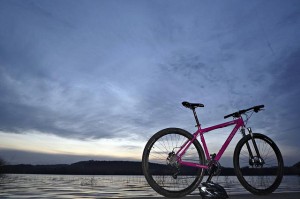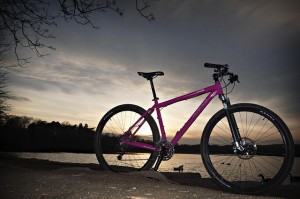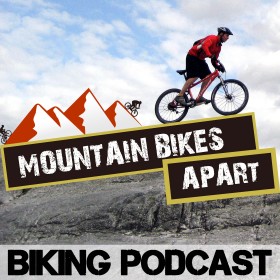If there’s anything that seems to be right in biking fashion at the moment, it’s 29er mountain bikes. I can’t move for 29er articles, 29 bikes in the local shop and 29er fanatics trying to convert me at every turn. So, hey, I thought, why not add to the cocophany and write even more about them? Why not indeed.
Seriously though, I had no idea really what 29ers were for, and possibly neither have you. What’s the advantage of a 29er? In what situation would you want to use a 29 bike? Well, recently I endeavored to find out the answers to all of these questions and, generous guy that I am, here I’ll share what I found out!
What is a 29er Bike?
This is simple at least: a 29er is nothing more than a mountain bike that’s built to run on 700cc wheels. “Woah!”, I hear you say, “Isn’t that getting dangerously close to lycra-clad, tarmac-fetish cycling?” Well, yes, a little. Mountain bike rims are traditionally 26″ in diameter, while road bikes run on 700cc, or 29″ rims. 29er bikes are attempting to profit from the advantages of bigger rims by building stronger, wider road-bike sized wheels and taking them off-road.
What are the Advantages of 29er Mountain Bikes?
So, to the 29er bike advantages. Why bother to increase your wheel size? After all, the whole bike needs adjusted to accomodate the extra wheel diameter. What do you gain by going 29er:
- An increased ability to roll over obstacles. The larger wheel can clear rocks, roots, steps and badgers more easily thanks to the reduced striking angle. Basically, on a 29er you can roll over a rock with less effort and less lost speed than on a 26″ mountain bike.
- Increased ground clearance. Thanks to the larger wheels your bottom bracket, chainset and pedals are further from the ground and therefore you’ll grind over rocks and logs a bit less often.
- Thanks to the greater diameter of your wheels, they have a much greater angular momentum than their smaller 26″ counterparts. This basically means they carry speed through the rough stuff much more effectively, acting as if they’re much more heavy and harder to slow down than smaller wheels.
- If you’re big, bigger wheels will suit you better. Pretty common sense this, but worth mentioning – many taller rider struggle to find frames to fit. With bigger wheels comes a more natural geometry of frame for bigger guys and gals.
- An higher feeling of stability. Many people claim that putting 29ers on a bike increases it’s stability, feeling a lot less twitchy than the equivalent 26″. This could be thanks to the aforementioned increased angular momentum, or the increased weight, but apparently a 29er just feels more planted on the trail.
What are the Disadvantages of a 29er Mountain Bike?
So, there seem to be a few good reasons to get a 29er above. A smoother, faster, easier ride – all good huh? Well, not quite – the big wheels bring with them a few drawbacks:
- Firstly, it’s still pretty hard to find a good choice in 29er bike rims, 29er tyres and all the other normal wheel paraphanalia that you can find so much of in good old 26″. This is changing of course as more manufacturers jump on the 29 bike bandwagon.
- 29er wheels are heavier than their 26″ counterparts, simply because they’re bigger. This increase in weight makes 29er bikes slower to accelerate and harder to stop than an equivalent 26″ bike. Even the forks have to be slightly longer than on a traditional mountain bike thus adding further weight.
- Due to the increased angular momentum of the wheel that I mentioned above, 29 bikes require more force to turn the wheel. This is exacerbated by a larger contact patch with the ground. All this means that it just takes a little more effort to turn your bike, making cornering slightly less responsive.
- Thanks to the increased length of the spokes and the larger forces due to increased diameter of the rim, 29er bikes tend to suffer from more flexible rims, making the ride seem a little more ‘wobbly’ to use a very technical term.
Conclusions on the 29er Conundrum
After a fair bit of reading, I’ve come across a number of different opinions on 29ers, and I suspect it’s very much the same as any other bike rivalry – hardtail vs full-sus anyone? The most common opinion that I’ve found, though, is that 29ers just don’t have the nippiness, the flexibility and the fun factor that their smaller cousins have. Yes, 29ers take some of the bump and grind out of the trail. Yes, a 29 bike feels faster on the uphill and more stable on the downhill. Yes, you’ll catch yourself on less roots and rocks.
But… more often than not riders just seem to prefer the acceleration, responsiveness and pure fun of a 26″ bike. It makes sense I suppose. Hands up: who out there got into mountain biking for the stability and comfort it offered? No-one…? Thought so…
Give me your opinions though – have you ridden a 29er? Tell me what you thought? Have you been converted? I’d love to hear.
Image Credit: Flickr placid_casual




I was firmly in the 26 fs camp since I designed bikes for Marin and whyte in 1998 now I only ride rigid 29er
I now ride my own designed short chain stay 29 er 407-427 mm it is stunning over the trails i ride
It climbs well and is great on even the tightest single track
Just a little maths shows you that a 29 er wheel 15% longer distance to ride over any bump, so the acceleration seen by the rider must be less than it’s 26 brother
Hi Adrian,
Thanks very much for the input on the 29er conundrum – you’re obviously a pretty experienced guy in that area! Where about do you ride?
Your self-designed bike there sounds interesting! What made you go for a shorter chain stay – what benefits do you get with that? And did you build the frame yourself, or get someone else to put together your design? I’ve been vaguely looking at a custom frame build, just because it’d be pretty cool to have a completely unique bike, but I’m wondering about quality. Can a custom frame builder compete with the big companies in terms of reliable quality?
Cheers!
Colin
Hey Colin, that guy above seemed like a troll, but I thought I’d tell you a little about my experiences with these bikes. I work at a bike shop in Missouri, and I sell a lot of 29ers. 6 months ago I had never heard of them, but I took one of our demo bikes (Specialized Rockhopper Expert, about $1000 worth of hardtail, mid-range 29er) out for some slightly technical singletrack; rocky, lots of roots, climbs with tons of tight switchbacks. That 29er blew through creek crossings and any other obstacles way easier than on my 26″ bike. I didn’t have to slow down or worry about placing my front wheel just so, and it rekindled my enthusiasm for the sport. I happened to be building myself a new Gary Fischer Ferrous 29er tonight, so email me if you want to discuss the build or you have any other questions about 29ers.
Cheers,
Trip
Hey Trip.
Would you be able to help me out buying a bike. I need a large frame though want a mountain bike which i would use to run a muck around town, though occasionally through bike trails. Any suggestions for around $1k. Im happy to bump my budget slightly higher if you think its worth it.
Thank you 🙂
P.S.: As to your comments about framebuilders, if you’ve got the money, you could do it, but why would you want to when there are literally millions of combinations of great parts from manufacturers large and small which you could probably get more cheaply than any custom job.
Check out Firefly at fireflybicycles.com for some cool custom fabrication that looks absolutely bulletproof, check out the closeups of their bottom brackets on their website; they’re works of art. Those frames start around $5,000, though.
If you wanted a full suspension bike or something that might take a lot of abuse, I would get a Trek Gary Fisher or something else from a similar corporate monolith with a warranty, then thrash that mother carefree. Just my two cents.
Hey Trip, thanks very much for the comments, really useful!
I might indeed get in touch about the 29er build. If you fancy taking a few photos and writing a wee account I’d happily put them on the site here and show my other readers what you’re up to.
As for the custom build debate, I think you’re right. The big manufacturers have been building/testing frames for decades now and have millions of pounds to put into reliability and performance testing. Somehow I think that’s just got to be an advantage over a hand-built bike…
Cheers!
Colin
Colin,
You said: ” Hands up: who out there got into mountain biking for the stability and comfort it offered? No-one…? Thought so…”
I’m 56 now, and the stability and comfort of my 29er makes what riding way more fun. Good article – thanks man.
I guess your article may have been right in 2011?